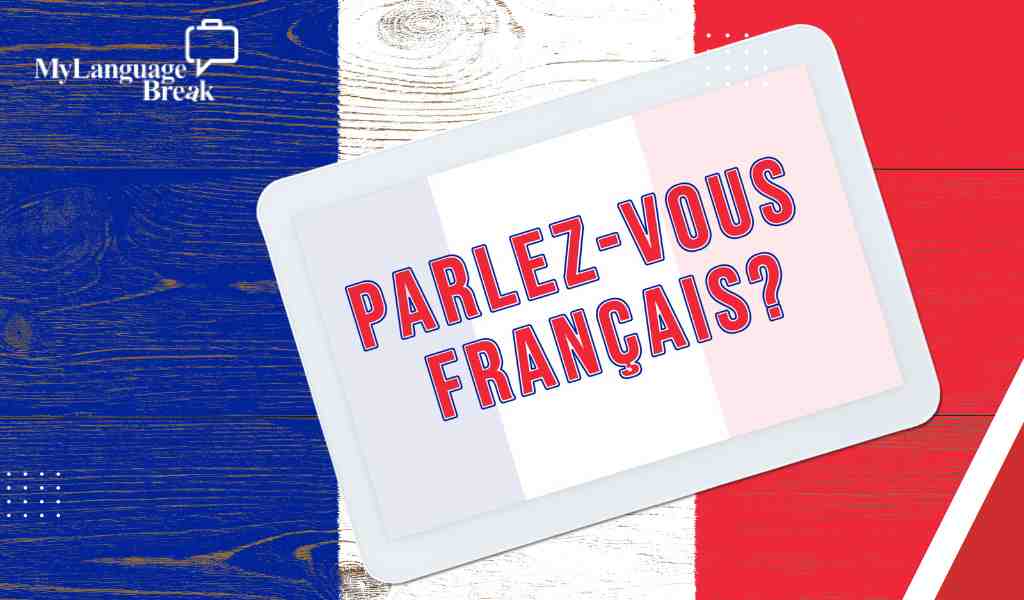French is one of the most difficult languages to learn due to its complex grammar and pronunciation. French has many rules that must be followed in order for a sentence to be correct. For example, verb conjugation is very important in French, as you must use the correct ending depending on the subject of the sentence. Additionally, gender plays a role in French, as nouns are either masculine or feminine, and this must be taken into account when forming sentences. Although there are many resources available now to help people learn French, it can still be a challenge due to its complex structure. Furthermore, learning the phonetics of French can also be difficult as there are several letter combinations that create unique sounds that do not exist in other languages.
But, in reality, it’s easier than you think. French has a lot of similarities with English, making it more approachable. It also uses Latin-based grammar rules, which make it easier for English speakers to understand and apply. Furthermore, compared to other languages such as Chinese or Japanese, French pronunciation isn’t too difficult either. All of these factors make French an accessible language to learn and can make the learning process enjoyable instead of intimidating.
Why is French a hard language to learn?
Learning French can be a difficult task for many people due to the numerous rules, exceptions, and pronunciation patterns that must be mastered. French is a Romance language, meaning it has Latin roots and is related to Spanish and Italian. This means that many of the grammar rules are similar or identical, but there are also key differences that add to the difficulty of learning the language. French is also a highly inflected language, meaning that words change depending on the context in which they are used. This requires an understanding of complex grammatical structures along with the memorization of numerous verb conjugations and tenses. Furthermore, French pronunciation can be tricky at first due to its nasal vowels and silent letters; with practice, it will get easier. All in all, learning French takes time and dedication if you want to master it.
What Can Make French Hard To Learn?
Learning a new language is always difficult, and French is no exception. There are many challenges that come with mastering French, such as its complex grammar and pronunciation. The pronunciation can be especially tricky, as certain sounds in French don’t exist in English. Additionally, the genders of nouns, articles, and adjectives must be memorized for proper usage. Furthermore, verb conjugations can also be daunting to learn and use correctly. In all these areas, there are exceptions to the rules that must also be taken into account. All these factors can make learning French quite challenging and require dedicated effort in order to become proficient in the language.
How Hard Is it to Learn French?
Learning French can be both challenging and rewarding. It is considered one of the most difficult languages to learn due to its complex grammar rules and pronunciation. However, with the right resources and dedication, anyone can learn French. To begin, it is important to understand basic grammar rules and common vocabulary words. After this foundation has been established, it is necessary to practice speaking and writing in French regularly in order to become fluent. Additionally, listening to audio recordings of native speakers or watching films with French subtitles can help improve comprehension. With consistent practice and dedication, learning French can be an enjoyable experience that leads to new opportunities for communication.

French Grammar Rules & Vocabulary
In French grammar, there are various rules and vocabulary that must be learned. First, it is important to understand the genders of nouns in French; all nouns have either a masculine or feminine gender, including words for animals, objects, and people. Next, verb conjugation is key to mastering French grammar. Verbs must be conjugated according to the subject pronoun used in a sentence; for example, “Je parle” (I speak), “Tu parles” (You speak), “Il/elle parle” (He/she speaks). Additionally, common French vocabularies such as basic greetings and courtesies should be mastered to become conversational in the language. Finally, understanding accents and diacritics is essential when it comes to properly pronouncing words in French. After mastering these grammar rules and vocabulary items, a learner will have the foundation they need to feel comfortable speaking and writing in French.
How You Can Learn French In A Matter of Months
Learning French in a matter of months is certainly possible. The key to success lies in devoting the right amount of time and effort to it. To begin, it is important that you have a basic understanding of the language’s grammar structure and vocabulary. This can be achieved through studying textbooks, watching videos, or seeking out online courses. Additionally, you should also practice speaking and listening skills with native speakers as much as possible, since this will help you become more confident in your abilities. Finally, make sure you immerse yourself in French culture by reading books or blogs in the language and watching movies or TV shows that are dubbed in French. By following these steps, you can learn French within a few months!

Tips for Learning French
1. Immerse Yourself: One of the best ways to learn a language is by immersing yourself in it. Listen to French music, watch French movies, read French books and newspapers, and speak with native French speakers whenever possible.
2. Practice Every Day: Regular practice is important for learning any language. Set aside a few minutes each day to practice your French skills—whether it’s reading, writing, or speaking.
3. Learn Key Phrases First: Start by learning key phrases such as greetings and basic questions so you can start having conversations right away. This will help you build confidence and make the language seem less intimidating.
4. Use Flashcards: Flashcards are great for memorizing new words and phrases. You can find sets of French flashcards online or create your own using index cards or a program like Anki or Quizlet.
5. Make Mistakes: Don’t be afraid to make mistakes when you’re speaking French — especially if you’re just starting out. The best way to learn is by doing, so don’t let fear of making mistakes stop you from practicing your new language skills.

Resources to Support Learning French
Learning French can be a fun and rewarding experience, but it can also be difficult without the right resources. Fortunately, there are many great resources available that can help make the learning process easier. For those looking to learn French from home, books, audio courses, and online courses are all great options. If you’re looking for a more interactive way to learn, there are many language schools and tutors who offer French classes both in-person and online. Additionally, websites such as Duolingo and Busuu offer free language-learning lessons with interactive activities. Finally, watching films in French or listening to French music can also be an effective way to practice the language while having fun. With these resources at your fingertips, you’ll be speaking French fluently in no time!
Another Opinion: French Is Easiest Language
Another opinion is that French is easier to learn than other languages. This could be due to the fact that the language has a relatively straightforward grammar structure, with clear rules for verb conjugation and noun genders. Additionally, French pronunciation is quite easy to master when compared to other languages, and there are many cognates between English and French, which makes learning vocabulary more straightforward. Furthermore, the language has fewer irregularities than other languages, which can make it easier to remember essential words and phrases. Overall, while some may find certain aspects of French challenging, such as understanding idiomatic expressions or creating complex sentences, it is still considered an accessible language for learners of all abilities.
Why is French considered easy to learn?
French is one of the most widely spoken languages in the world, and it can seem intimidating to learn. However, French is actually much easier than you think! Its vocabulary is derived from Latin, creating an intuitive language that many English speakers find relatively straightforward to understand. In addition, French pronunciation follows a very logical pattern, and its grammar rules are consistent throughout. This makes learning French much simpler than other languages such as Japanese or Mandarin. Furthermore, there are countless online tools available that make learning French fun and interactive, such as podcasts and apps. With a bit of dedication and practice, you can quickly gain confidence in your ability to use the language correctly!

The Easy Parts of Learning French
Learning French is fun and rewarding, and can open up a world of new opportunities for communication. Even though the language can be tricky at times, there are certain aspects that are quite easy to learn. The French alphabet is similar to the English alphabet and pronunciation is straightforward once you learn the basic rules. Additionally, there are many cognates between French and English which means words with similar spelling or meaning in both languages, allowing you to quickly build your vocabulary. Finally, French grammar follows relatively simple patterns that make it easier to construct sentences correctly. With practice, anyone can learn the basics of French and start using it in everyday life!
Or could it be easier than you think?
It’s an interesting question and one that has been debated for years. In some cases, the answer may be yes. Certain tasks or projects can seem daunting at first glance, but with a little bit of effort and organization, it’s often possible to make them much simpler. On the other hand, some things may not be as easy as they appear. Time-consuming projects like research papers or large financial transactions can take months or even years to complete properly. The key is to break down complex tasks into smaller chunks so that each step can be completed more easily and efficiently. By taking a strategic approach to complex problems and breaking them down into manageable steps, you might find that the task isn’t as difficult as you initially believed it to be.
Conclusion
In conclusion, learning French can be a challenging task for language learners. However, with the right tools and determination, it is possible to become proficient in the language. To begin, find a reliable curriculum or language-learning program that fits your goals and learning style. Additionally, take advantage of available resources such as online forums and conversations with native speakers to increase your knowledge base. Finally, make it a habit to practice regularly, and don’t give up if you hit a roadblock.
